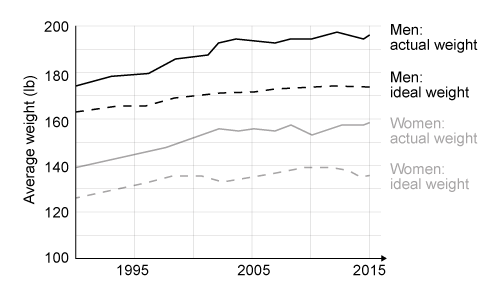Passage
Almost 70% of Americans today are either overweight or obese, but only 34% think they weigh too much. This is in contrast to 1990, when 54% of Americans were overweight or obese and 46% reported being at least somewhat overweight. In other words, the gap between what we weigh and what we think we weigh is getting bigger.Epidemiologists argue that this discrepancy can be partly explained by the widespread resetting of norms regarding "normal weight" and "obesity." As close friends, coworkers, and family members gain weight, one's concept of what a body of acceptable weight looks like becomes modified. What was once considered overweight is now considered the norm, if only because it is so common (Figure 1) .
 Figure 1 Actual vs. ideal weight (in pounds) for Americans, 1990-2015This sheds new light on recent efforts to stop the obesity epidemic in America. Experts have long contended that awareness efforts don't work because overweight individuals are already aware that they are overweight and that obesity causes health problems. These latest data suggest that many overweight Americans don't even realize that they are overweight. Epidemiologists are now suggesting that a more successful strategy to get Americans to lose weight might be to first succeed at convincing them that being overweight is not normal.
Figure 1 Actual vs. ideal weight (in pounds) for Americans, 1990-2015This sheds new light on recent efforts to stop the obesity epidemic in America. Experts have long contended that awareness efforts don't work because overweight individuals are already aware that they are overweight and that obesity causes health problems. These latest data suggest that many overweight Americans don't even realize that they are overweight. Epidemiologists are now suggesting that a more successful strategy to get Americans to lose weight might be to first succeed at convincing them that being overweight is not normal.
-According to the last paragraph, the challenge faced by epidemiologists is:
A) encouraging social stigma.
B) overriding social sanctions.
C) reorganizing social networks.
D) resetting social norms.
Correct Answer:
Verified
Q193: Passage
Studies suggest that health outcomes for preventable
Q194: Passage
For decades psychologists have known that people
Q195: Passage
Almost 70% of Americans today are either
Q196: Passage
Studies suggest that health outcomes for preventable
Q197: Passage
Korsakoff syndrome (KS) is caused by a
Q199: Passage
Korsakoff syndrome (KS) is caused by a
Q200: Passage
For decades psychologists have known that people
Q201: Passage
Human emotions play an important role in
Q202: Passage
Human emotions play an important role in
Q203: Passage
Until the middle of the twentieth century,
Unlock this Answer For Free Now!
View this answer and more for free by performing one of the following actions

Scan the QR code to install the App and get 2 free unlocks

Unlock quizzes for free by uploading documents